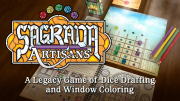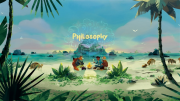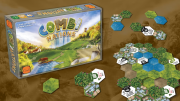The Fox Experiment (Pandasaurus Games) – Designed by Elizabeth Hargrave (Wingspan) and Jeff Fraser, in The Fox Experiment you are trying to breed domesticated foxes. Each round you draft two fox parents that exhibit specific traits. These traits will then allow you to roll certain dice, which you will roll to try to complete symbols to pass traits on to the foxes you can then choose to draft next round. Foxes with certain traits will allow you to complete studies, earn upgrades, and gain extra points.
Casual Game Crowdfunding: Foxes, Artisans, and Spies

This month on Kickstarter, Pandasaurus brings a new game from the designer of Wingspan, while Floodgate Games introduces a legacy adaptation of Sagrada. Meanwhile, over on Gamefound there’s a reprint of a 2002 Ravensburger building game and an abstract strategy game of moving tiles. This month also brings us social deduction, pirates, and a clever tile-laying game of country building.
Sagrada: Artisans (Floodgate Games) – A standalone dice drafting legacy game in the Sagrada line. You take on the role of a stained glass artisan family working on a cathedral for several decades. Each round the dice will be rolled. You will take turns drafting dice and using colored pencils to fill in spaces in your window. You will gain renown and unlock new tools and abilities that carry through into future games.
M.O.R.P.H.O. (Ice Makes) – In this social deduction game, each player is given two characters at the start of a round. Different characters have different goals for winning. On your turn you can look at another player's character card, swap one of your characters with the character card in the center of the table, or reveal one of your characters to use one of its abilities. The round ends once one player has achieved one of his character's win conditions and earns points. You then set up for a new round. The first player to reach ten points wins the game.
Lying Pirates (Nordic Pirate Games) – This pirate-themed game is played over a series of rounds with each round having three phases: betting, sailing, and action. During the betting phase, all players roll their dice and secretly look at the values on their own dice. Then players take turns making bets on how many of a specific die face has been rolled by all the players combined. Players keep betting until someone calls a bet and then all dice are revealed, with either the player who called the bet or the player who made the bet, earning a bonus with the other player losing. During the sailing phase, everyone but the player who lost the betting phase sails 1-2 steps forward on the map, with players sharing a space battling for the event tile they landed on to see who triggers it. Some events are helpful while others will hurt you. Finally, during the action phase, players can play an action card from their hand to battle opponents or gain useful supplies.
Pueblo (Mojito Studios) – A brand new version of the 2002 game Pueblo, in this game players are builders, building on the same shared game board. On your turn, you place a block from your supply, which includes both neutral blocks and blocks of your player color, onto the board and then move the chieftain token around the edge of the board up to four spaces. The chieftain then gives penalty points to any player with blocks of their player color in his line of sight. The player with the fewest penalty points at the end of the game is the winner.
Philosophy (Quality Beast) – In this two-player abstract strategy game, you are trying to get three of your idea tiles in a row on the board. Each turn, you choose one of your tiles and place it on the game board. Each tile has two icons. One icon indicates which space on the board it will affect and the other icon says what will happen to the other player's tile if it is on that location. These effects will move your opponent's tiles around the board, and can create chain reactions if a tile is moved into a space that is targeted by a second one of your tiles, with that second effect then becoming triggered. These chain reactions can continue, across multiple effects and spaces.
Combi-Nations (Corné van Moorsel) – Each player is building a country by placing tiles of various sizes on their personal country boards. There is a circular market board around which each player has their player arrow. On your turn, you may move your arrow 1-3 spaces around this board. You then move the market token the same number of spaces around the center of the market board from one stack of face-down tiles to another. You then take a tile from the stack in front of where the market token ends and place it on the market space where your arrow came from. Finally, you take the tile that your arrow landed on and add it to your country. Players earn points for clusters of tiles of matching land types, for having the largest cluster of a specific type of land, and for unique facility tiles that have special scoring rules.
Disclosure: unless otherwise noted, we have not seen or played any of the above games. Our assessment of each is based on the information given on the crowdfunding project page.











